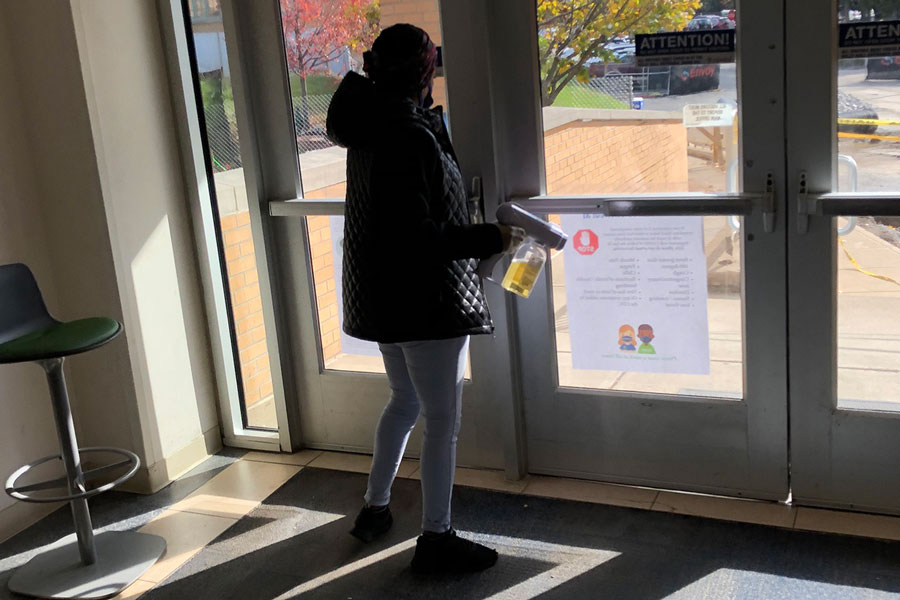Custodians provide an essential service during Covid
Mission Mondays give staff the opportunity for deep cleaning
Immediately after a passing period on Oct. 29, an EMS staff member disinfects the door handles on the southwest entrance of Kelly Hall.
The frontline of the Covid-19 pandemic by now is a fairly familiar one.
Doctors and nurses have spent long hours assisting patients through an unfamiliar disease with varying levels of supplies and have been celebrated across the world for their grace under pressure. Recently, teachers have been recognized as individuals fighting back against a viral threat by continuing to deliver education to a generation disrupted.
But there is another profession that is directly responsible for people’s safety but might go unnoticed.
Custodians and janitors have been labeled as essential workers since the beginning of the pandemic in March, and the cleaning crews walking the halls dressed in burgundy are no exception.
Mrs. Betty Graham has “been in the business for years,” she said, and added that she is well versed in sanitization. At the beginning of the year, she and her colleagues received paperwork from their employer, Executive Management Services, that detailed new instructions on measures to be taken to prevent the spread of Covid-19.
The cleanings performed every class such as wiping down desks, whiteboard markers and other surfaces students and teachers come in contact with are only the beginning. “We sanitize everything. Door handles, doors, floors. We use a sanitized floor mop,” Graham said. She said that, referring to the school’s more than 1,000 students, “everything you all touch” must be cleaned, including weight room equipment and even the walls.
The adoption of Mission Mondays allows for more in-depth cleaning over the weekends. Graham said, “We can do extra stuff on Mondays since you all aren’t here.” A significant decrease in the amount of bodies in the building allows for everything to settle while the professionals can clean bathrooms, take out the trash and go over high contact surfaces.
Additionally, with a smaller window of time to congregate in an enclosed area, the virus hopefully will not spread as quickly through the student and faculty body. “It’s a lot more work,” said Graham.
Graham said that she believes the cleaning measures adopted this year are sufficient and appear to be working so far. “I don’t hear about a lot of people getting it at school so we must be doing something right,” she said. The sanitization protocols are reassuring to Graham, even if they take more time to complete, because, she said, “I don’t get sick and neither do my workers. They can come in and do their job.”
The work is important for the well being of the school. Graham said, “I feel pretty good about it. We can make sure kids don’t get sick. I don’t want anybody to get sick so they can’t do their duties, learning, working, teaching. The teachers need to be here to teach the children.”
Students can do their part as well. Aside from following proper mask protocol and utilizing the five-minute cleaning break, Graham said “the only thing for students is to keep hands washed and sanitized.”
Remember, 20 seconds goes a long way. That time might not only protect you, but your friends, teachers and the professionals who work to keep the entire campus safe and clean.

Andrew de las Alas is a senior and reporter for the Megaphone. He runs varsity cross-country, is co-captain of the speech and debate team and co-president...







